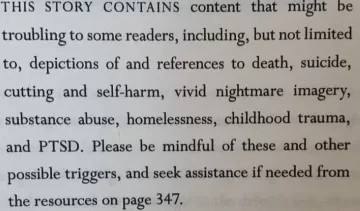Why books should come with trigger warnings

May 5, 2022
Reading is a common pastime, whether you take a more casual approach of reading a chapter or two a night or you pick up a new several-hundred page book each week. Regardless of your taste in literature, from nonfiction to fantasy, everyone has certain triggers that they’d prefer not to read about. Some people are upset by sexual themes, some by descriptions of assault or harassment, and still others by details of abuse, torture, and psychologically damaging actions. Readers, for the most part, would rather not pick up a book and find themselves enthralled by it, only for the story to take such a drastic turn into something that completely sickens them, or worse, causes them real harm by bringing back memories from their experiences. If books were required to have trigger warnings, it would help readers better navigate the tempestuous world of novels, accounts, and biographies without being sent into an uncomfortable state because of the triggering themes therein.
It isn’t always easy to tell what you’re getting yourself into when you pick up a new book, and a majority of the time, the back cover won’t have the information necessary to tell if you’re about to read something with potentially triggering themes. Of course, it’s hard to talk about trigger warnings in books without setting a baseline for what potential triggers are, or at least what defines a trigger. Triggers in books are themes or scenarios that elicit an unwanted, usually damaging response from the reader, possibly causing psychological harm to the reader. Because of this rather open-ended definition, it can be hard to determine what counts as a trigger, with some critics arguing that anything could be a trigger depending on the reader. Because of this, we should look at common themes and scenes that a large amount of readers deem to be triggering, such as rape, sexual assault/harassment, physical/emotional abuse, vivid descriptions of gore/death, and sexual themes. These can range from isolated incidents to an overarching theme throughout the entire story, depending on the book and the readers.
This begs the question, how should we implement these trigger warnings? The easiest way would be to print it on the inside cover of the book. Those who don’t feel like they need a trigger warning can simply skip that page, while those who have certain triggers can check to ensure they won’t be reading something that could harm them. Those against these trigger warnings may argue that expecting readers who don’t want to have potential plotlines “spoiled” by the trigger warnings shouldn’t be expected to skip the page, and the page should simply not exist at all. This may sound like a decent point at first, however, it implies that readers who don’t have triggers shouldn’t have to go out of their way to skip a page while readers who do have triggers should either have to research the book online, potentially receiving more major spoilers than simply knowing there are certain themes in it, or have to read the book with no prior knowledge of whether the book will contain potentially damaging themes. Of course, the easiest way to implement trigger warnings that satisfies both readers with and readers without triggers is to post trigger warnings for books online, like the website Book Trigger Warnings, who make it their goal to help readers feel comfortable and safe with their hobby. This, however, comes with the downside of reviewers needing time to write trigger warnings for newer books, or books from lesser-known authors.
Whether or not you have triggers, it is important to have trigger warning for books so that those of us who are affected by triggering themes and scenarios can continue to read books they enjoy without being subjected to the triggers that are so harmful to them. Literature, for many readers, is an escape from their lives and experiences, and needlessly causing them to relive their most damaging memories can and will cause more harm than good, especially when the alternative is so simple.


